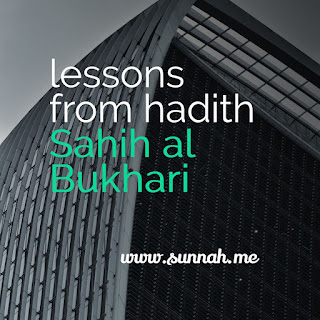Chapter 2 A person who is asked about a matter of knowledge is busy explaining then he completes his explanation and then answers the questioner

(From the audio recording of the study of the book of Sahih Bukhari by the presenter al Ustadz Muhammad Afifuddin hafizhahullah)
59th HADITH AND TRANSLATION
حدثنا محمد بن سنان قال : حدثنا فليح (ح)
From Abu Hurairah radhiyallahu 'anhu he said: "When the Prophet was among us in an assembly, he gave an explanation to his companions. Came to him an A'robi (Arab mountains) asked "When will the apocalypse happen?"
و حدثني إبراهيم بن المنذرقال : حدثنا محمد بن فليح قال : حدثني أبي قال : حدثني هلال بن علي ، عن عطاء بن يسار ، عن أبي هريرة قال : بينما النبي ﷺ في مجلس يحدث القوم ، جاءه أعرابـي فقـال: متى الساعة؟. فمضى رسول الله ﷺ يحدث ، فقال بعض القوم : سمع ما قال : فكره ما قال . وقال بعضهم : بل لم يسمع . حتى إذا قضى حديثه قال : « أين - أراء - السائل عن الساعة » . قال : ها أنا يا رسول الله ، قال : « فإذا ضيعت الأمانة فانتظر الساعة» . قال : كيف إضاعتها ؟قال : « إذا وسد الأمر إلى غير أهله فانتظر الساعة » [انظر: ٢٦٤٩٦ ]
So the Prophet continued his explanation.
So some of the people commented: "The Messenger of Allah heard the person's words but did not like what he said."
Others said: "He did not hear"
Until when the Prophet completed his explanation, he said: "Where is the questioner that I saw earlier asking about the apocalypse?"
The A'robi said: "It's me, O Messenger of Allah."
The Messenger of Allah replied: "If the trust is wasted, then wait for the apocalypse."
The a'robi person asked again: "What is the form of wasting that trust?"
Rasulullah replied: "If the matter is left to those who are not experts, then wait for the Day of Resurrection (destruction)."
LESSONS FROM THE 59th HADITH
+ This hadith is one of the hadiths that explain adab a'lim (knowledgeable) and muta'allim (learn knowledge)
The Messenger of Allah when he was giving an explanation was then asked by an A'robi, he did not answer immediately but continued his explanation. After he finished explaining, he answered the questioner's question. However, not all questions between explanations should be silenced. However, it depends on who the questioner is and how the question is.
In a narration it is explained that the Messenger of Allah answered someone's question when he was delivering the Friday sermon.
+ It is prescribed to teach knowledge to others as a form of da'wah ilallah
+ Permitted dauroh events, muhadhoroh, tabligh akbar, and so on
+ Permissibility of ta'lim with an informal assembly form (specifically). Ta'lim can be done while walking, riding a vehicle, and various other occasions.
+ Knowledge can also be in the form of questions and answers
+ Among the manners of asking questions is waiting for the free time of the person being asked, not when he is busy giving an explanation.
+ The adab of a mu'allim (teacher) is gentle and friendly in teaching knowledge as exemplified by the Prophet
+ It is permissible to ask the scholars for clarity about their fatwa if someone does not understand or is worried about misunderstanding the fatwa.
+ No one knows when the doomsday will occur except Allah. The Messenger of Allah when asked when the doomsday will occur did not answer with the time, but with its signs.
+ Imam al-Hafizh explained about the suitability of this hadith with the book of knowledge, namely relying on knowledge matters to those who are not experts. This occurs when ignorance has spread and knowledge has been raised, which is a sign of the apocalypse.
+ Imam al-Hafizh also explains that in this narration it is as if al-Imam al-Bukhari hinted that knowledge was taken from the akabir (cleric dignitaries), not from the ashogir.
+ Imam Abdullah Ibnul Mubarok explained that what is meant by ashogir is ahlul bid'ah. So that this hadith is used as an argument by the scholars in the form of a prohibition on taking knowledge from heretics.
+ The sentence "If a matter is entrusted to those who are not experts, then wait for its damage (destruction)" in this hadith explains the standard rules that are not only in the chapter of knowledge, but in all cases. Both worldly and hereafter.
===
Halaman ini diterjemahkan menggunakan google translate dari halaman aslinya https://www.sunnah.me/2022/05/bab-2-seseorang-yang-ditanya-tentang-ilmu-ketika-sedang-menjelaskan.html. Apabila ada translasi yang kurang tepat, silakan koreksi melalui kolom komentar.
Posting Komentar untuk "Chapter 2 A person who is asked about a matter of knowledge is busy explaining then he completes his explanation and then answers the questioner"